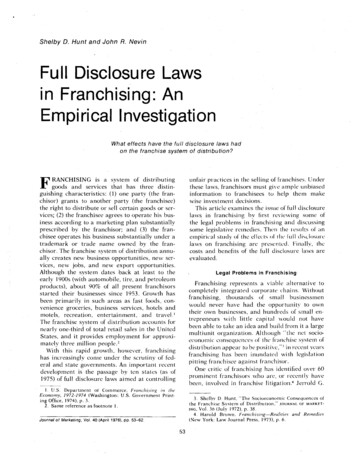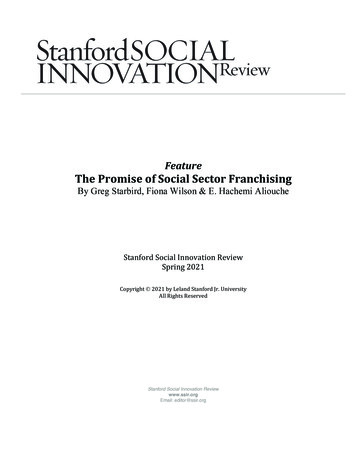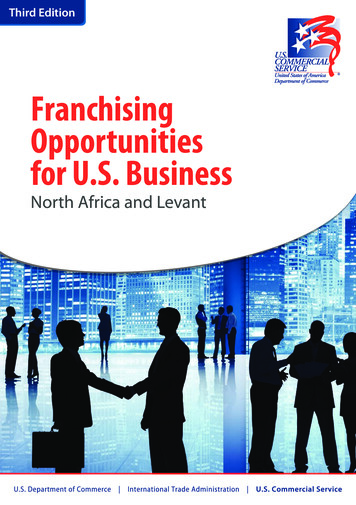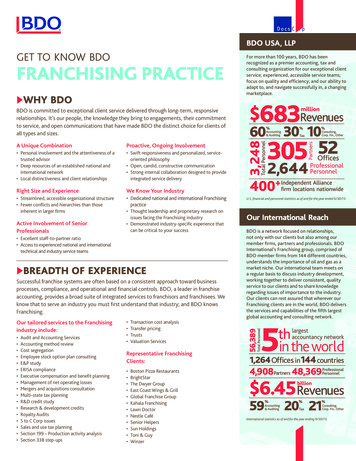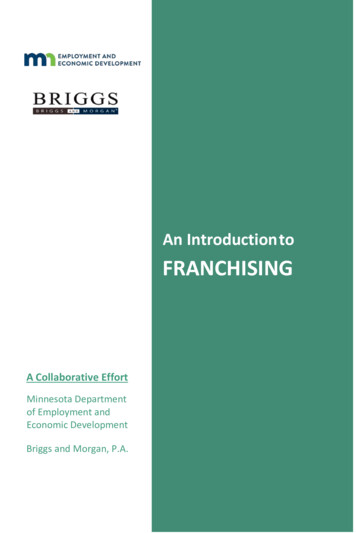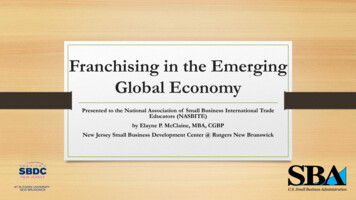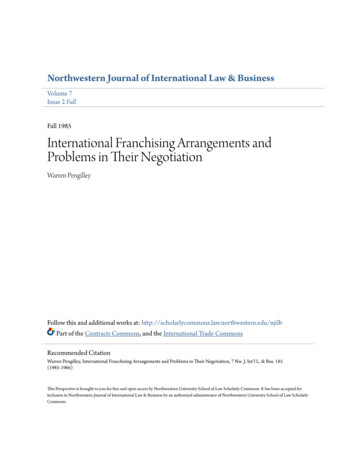
Transcription
Northwestern Journal of International Law & BusinessVolume 7Issue 2 FallFall 1985International Franchising Arrangements andProblems in Their NegotiationWarren PengilleyFollow this and additional works at: Part of the Contracts Commons, and the International Trade CommonsRecommended CitationWarren Pengilley, International Franchising Arrangements and Problems in Their Negotiation, 7 Nw. J. Int'l L. & Bus. 185(1985-1986)This Perspective is brought to you for free and open access by Northwestern University School of Law Scholarly Commons. It has been accepted forinclusion in Northwestern Journal of International Law & Business by an authorized administrator of Northwestern University School of Law ScholarlyCommons.
PERSPECTIVEInternational Franchising Arrangementsand Problems in Their NegotiationWarren Pengilley*I.INTRODUCTIONIn an audience from diverse backgrounds and from countries withquite different economies, it is not easy to find the right level at which topitch a paper on international franchising. The author has, therefore,worked on the basis that this paper should begin with fundamental principles of franchising. The author apologizes to those with a moreprofound knowledge of franchising should he have made, in their case,an incorrect policy decision.The material in this paper is compiled chiefly from personal experience and from the experience of others. Most opinions in this paper,even on allegedly "objective" issues, are probably subjective.The author believes that franchising is little understood in legal circles. This is demonstrated by the various legislative approaches whichhave been adopted. In many countries, there is simply no law directlyapplicable to franchising. In some, such as the United States, Australia,and the Province of Alberta in Canada there are various requirements* B.A., LL.B (Sydney); J.D. (Vanderbilt); M. Com. (Newcastle), AASA, CPA; Solicitor, Sly &Russell, Sydney; Formerly, Commissioner, Australian Trade Practices Commission. This Perspective was originally prepared as a speech for presentation at the Eighth Commonwealth Law Conference in Ocho Rios, Jamaica, September 1986.
Northwestern Journal ofInternational Law & Business7:185(1985)primarily based on pre-disclosure-a concept akin to that of a companyprospectus.Almost certainly the reason for the lack of any common jurisprudential approach to franchising is that franchising relationships simplydo not fit neatly into any of the common law moulds with which we areall familiar. Franchising typically partakes of a number of these relationships while not totally embracing any of them. For example, it partakesof, but does not totally embrace, the concepts of (1) employer and employee; (2) distributorship; (3) licensor and licensee; (4) agency; or(5) vendor and purchaser, to varying degrees, depending upon individualtransactions. As one learned American author on franchising has put it:only since World War II and increasingly in the past ten years has franchising achieved recognition as a distinct method of marketing . [but] .there is no generally accepted definition of franchising in court decisions,regulation or legislation. Further, any definition would fail to include themany functions inherent in the system, as well as its potential forabuse .1Given this lack of a legal definition, it is difficult to speak in terms ofthe law of any particular country. To study in this paper the laws of anyone country rather than those of others would be an arbitrary, and unjustifiable, decision. To study the laws of all countries would be a feat beyond a paper of this length. The author has chosen, therefore, to speakin terms of broad principle because, despite the absence of a uniformlegal approach to franchising, the broad economic and marketing parameters are similar in all countries in which franchising takes place.Because of the scope of franchising, and particularly of internationalfranchising, the basic problems involved in negotiation of franchisingagreements are most frequently not inherently legal in nature. They aremore likely to be problems of business, psychology, politics, and cultureor problems of a technical and scientific kind. Above all, they are likelyto be problems of tact, diplomacy, strategy, and tactics. Lawyers may ormay not be good at solving these problems. But if the lawyer cannot lookbeyond the law, the lawyer will be a far greater hindrance than a help inany franchising negotiations. Unfortunately, lawyers do not necessarilyreceive basic training in the arts mentioned and many in the field of commerce argue that lawyers are not skilled in such arts.II.WHAT IS FRANCHISING?Franchising is a relationship which is very difficult to define in black1 H. BROWN, FRANCHISING REMEDIES AND REALITIES 1 (1972).
FranchisingArrangements7:185(1985)letter terms-a factor which, of course, makes it so hard for legislators towrite any laws about it.It seems to be common ground that the franchising concept involvesat least the following basics:1. The use by a franchisee of a trade or quality mark or logo held by thefranchisor;2. The grant of a right by a franchisor to a franchisee to sell or use adeveloped system, product, or service;3. The payment by the franchisee to the franchisor of consideration (usually an "up front" fee or a "royalty on sales" or some combination ofthe two).That these basic concepts express generality is, however, readily apparent when one considers case law in the United States. In that country, economic issues have been extensively examined in the context offranchise restraints and in the application of the antitrust laws. When atrademark indicates the source of a product, the restraints allowed underUnited States antitrust laws have been markedly different to those allowed where the trademark indicates the quality of a product.2In the usual case, a franchisor, under United States antitrust law,cannot "tie" the franchisee to purchase subsidiary or secondary products(in a fast food franchise, products such as napkins and table cloths forexample). Nevertheless, quite extensive franchise ties have been permitted under such laws where the item being franchised is a whole systemwhich, in the words of the court in Principe v. McDonalds:offers its franchisees a complete method of doing business (in which) .its regime pervades all facets of the business from the design of the menuboard down to the amount of catsup on the hamburgers nothing (being) leftto chance.In such a case there is, according to the United States courts, simplyno subsidiary product to "tie." The whole system, complete with its totality of purchase requirements is one "product." The question ofwhether subsidiary product purchase requirements are illegal does notarise.This paper is not intended to delve into the mysteries of UnitedStates antitrust law. The fact, however, that United States courts have2 See generally Hambro v. Shell Oil, 1982-1 Trade Cas. (CCH) 64,717 (9th Cir., Apr. 12, 1982);Jack Walters & Sons v. Morton Buildings, Inc., 1983-1 Trade Cas. %65,284 (E.D. Wis. Mar. 11,1983); California Glazed Products Inc. v. Burns & Russell Co., 708 F.2d 1423 (9th Cir.), cert. denied, 464 U.S. 938 (1983); Power Test Petroleum Distributors v. Calcu Gas Inc., 754 F.2d 91 (2dCir. 1985).3 Principe v. McDonald's Corp., 631 F.2d 303 (4th Cir. 1980), cert. denied, 451 U.S. 970(1981); Cf Siegel v. Chicken Delight, 448 F.2d 43 (9th Cir. 1971) and Kentucky Fried ChickenCorp. v. Diversified Packaging Corp., 549 F.2d 368 (5th Cir. 1977).
Northwestern Journal ofInternational Law & Business7:185(1985)been able to develop totally different economic rationales for arrangements which we would all typecast as "franchises" should make us waryof too readily placing all franchise arrangements into one commonmould. Within the generality of the franchising concept, there are considerable individual differences.While franchising initially began as a method of manufacturing ordistributing products, increasing sophistication in franchising has givenrise to an ever increasing growth of "systems franchises." It is in thisarea that the greatest current expansion in franchising is taking place.The "systems franchise" trend causes considerable frustration for lawyers. Necessarily if the "system" works successfully, the parameters fornegotiation of variations are narrow. It is no use, for example, attempting to negotiate with McDonalds to install a pay phone in theirfranchised fast food outlets. They will not negotiate on this point. It issimply not part of the "system" so loudly and judicially praised for itssuccess in Principe. The negotiating lawyer, therefore, needs to knowmore than just the law. The lawyer has to have marketing and commercial expertise to understand the reasons for the often apparently intransigent negotiating posture of franchisors. The lawyer must be able toexplain the "systems" logic to the client. Above all, the lawyer musthave the capacity to distinguish that which is commercially importantfrom that which is not and that which is of negotiating importance fromthat which is trivial.III.THE MARKETING RATIONALE OF FRANCHISINGTo the franchising enthusiast, the franchising marketing rationale isboth simple and self evident. The points made by such an enthusiast are:1. The small independent business has the benefit of the franchisor's expertise on matters such as site selection, operating manuals, and building plans. The small entity does not, therefore, have to conductresearch on these matters. The small business probably could not afford the research and lacks the expertise in any event.2. The large business can expand by its use of a unifying concept or idea.The franchisor does not have to find the immense capital required toestablish its own outlets. The franchising enthusiast argues that, in theabsence of franchising, the expertise of the large business would eitherbe unexploited or exploited imperfectly.Employing this logic and various extensions of it, it is argued thatthe proven systems and more sophisticated business procedures of thelarger enterprise can be combined with the individual motivation of thesmaller owner-operator franchisee. Some argue that the franchise is themost feasible alternative to vertical integration and thus represents the
FranchisingArrangements7:185(1985)most promising hope for the preservation of the independent small business in many societies today. Furthermore, a proven franchise systeminspires confidence in consumers who are assured of the quality of product and service regardless of the particular outlet which is patronized.There appears to be little doubt that franchising does have afavorable track record in terms of business success, although there havebeen some dramatic failures.4 Furthermore, franchising accounts for anincreasing quantity of sales-especially retail sales'-and continues toexpand into an ever-increasing range of goods and services, as is witnessed by studies in the United States, Australia,6 Britain,7 and Canada.'4 See Ziedman, Regulation of Franchisingby the FederalTrade Commission, 17 Bus. LAW. 135(1972); SELECT COMMITTEE ON SMALL BUSINESS, UNITED STATES SENATE, THE IMPACT ONFRANCHISING ON SMALL BUSINESS, S. Doc. No. 91-1544, 91st Cong., 2d Sess. 5, 6 (1970); J.O.VON KALINOWSKI, ANTITRUST LAWS AND TRADE REGULATION (1969); Hunt, Franchising:Promises, Problems and Prospects, 53 J. RETAIL 3 (1977); B.L. JOHNS, W.C. DUNLOP & W.J.SHEEHAN, SMALL BUSINESS IN AUSTRALIA (1978); REPORT OF THE TRADE PRACTICES CONSULTATIVE COMMITTEE INTO SMALL BUSINESS AND THE TRADE PRACTICES ACT (Canberra 1979). Seealso Brown, supra note 1, at 30.5 For example, in the United States "[f]ranchising accounts for one out of three retail dollarsspent in the country according to the United States Department of Commerce. One estimate hasbeen made that there were about 471,000 franchised outlets growing at the rate of 2 percent perannum. Franchised retail outlets accounted for about 13 percent of retail employment and 28 percent of retail sales." See Cady, Structural Trends in Retailing: The Decline of Small Business, 5 J.CONTEMP. Bus. 71 (1976). Franchised businesses were said, in 1976, to account for 239 billion inUnited States annual sales, 20 percent of the gross national product and over 35 percent of retailsales. See UNITED STATES DEPARTMENT OF COMMERCE, FRANCHISING IN THE ECONOMY 19751977 (1976). The United States Commerce Department predicts that over one half of retail sales willbe through franchised outlets by the year 2000 and that franchised sales have increased fourfoldfrom 1969 to 1984. See AUSTRALIAN FINANCIAL REVIEW, Feb. 5, 1985.In Australia, an estimate by Ibis Corporate Services concluded that in the fast food industrysales were 560 million in 1979 of which "old style operators" accounted for 55.6%. By 1983-84estimates were 760 million and 35 percent. By 1990, they anticipated that "old style operators"would have less than 10 percent of the market. See, AUSTRALIAN BUSINESS, Nov. 20, 1980. InAustralia, estimates have been made that franchising may account for 20 percent of retail tradethough this might be conservative see, W.J. PENGILLEY, FRANCHISING-WHAT IMPACT, WHATPROBLEMS, WHAT SOLUTIONS, (Monash University 1982).In Canada, franchising is estimated to exceed 30 billion annually or one third of all retail sales.See Zaid, The Canadian Franchise Market Trends and Challenges-Legal Considerations (Papergiven at a Franchising Seminar by The Board of Trade of Metropolitan Toronto on Nov. 17, 1983)[hereinafter Zaid].The British Franchise Association says that its members account for 280 million pounds of saleseach year. Combined sales outlets have doubled from 2,000 in 1979 to 4,000 in 1981 and membercompanies employ 20,000 people-a 24 percent increase since 1978. See THE SUCCESSFULFRANCHISE (1984) [hereinafter SUCCESSFUL FRANCHISE].6 See, eg., W.J. PENGILLEY, supra note 5. Franchising was noted in the following industries(and the list was not claimed to be exhaustive): fast foods, nursery care for toddlers, dentistry, quickprinting, hairdressing, computer stores, car tuning, home building, photography, lighting shops, funerals, day care schools, sewing machine centers and film retailing.7 For example, window blinds and associated services, driving tuition, car hire, parcel delivery,interior decorations, fast selling kitchen gadgets, pipe cleaning, restaurants, hotels, car tuning, print-
Northwestern Journal ofInternational Law & Business7:185(1985)Especially with the growth of "systems franchising," the industriesto which franchising methods can be adapted are seemingly endless. Thebasic requirements appear fairly minimal. All that is required is thatthere be a "system" which generates customer goodwill and acceptanceand that the "system" can be shown to fulfill a marketing need moreefficiently than a cold-start operation.IV.WHY FRANCHISE INTERNATIONALLY?In addition to the reasons for franchising domestically (which areapplicable to a greater or lesser degree internationally) the following reasons may be given for franchising internationally:1. To utilize local management personnel and thus overcome problems oflanguage and culture;2. To overcome problems of detailed supervision often otherwise insuperable because of distance;3. To leave compliance with local laws to those familiar with such lawsand thus be able to market a product in a target country without incurring liability under the laws of such country;4. To avoid laws which may inhibit or control foreign direct investment inparticular countries. Franchising enables a product to be marketed in acountry with restrictive direct investment laws without a direct investment being made by the franchisor in that country;5. To overcome political difficulties such as the possibility of expropriation of overseas investment. The franchisee will normally be a residentof the target country and probably less vulnerable to such threats. Inany event, if the property is expropriated, it is the franchisee's and notthe franchisor's loss;6. To take advantage of revenue, tax planning and similar financial considerations too complex to be discussed here. One of the more commonreasons for franchising is to avoid the tariff imposts which, notwithstanding a veritable barrage of international agreements, still inhibitworld trade. A franchise operation can avoid such tariffs. 9ing and photocopying, marine product retailing, print shops, formal wear hire, curtain cleaning,carpet repairs, hairdressing, confectionary retailing. SUCCESSFUL FRANCHISE, supra note 5, at 12526.8 See Zaid, supra note 5. Zaid notes Canadian franchise operations in personal care services,home cleaning operations, manpower support services, energy conservation planning, leisure timehobbies, computer services, restaurants, lodging institutions, fast print shops, automobile repair facilities, car rental agencies, and personal grooming centers.9 To these reasons must also be added the activities of United States agencies such as the Department of Commerce. In some cases, franchising has been spread by emigrant franchisees takingtheir known business system with them. For example, the Kentucky Fried Chicken and Pizza Hutfranchise systems both came to Australia, not directly from the United States, but via Canadianfranchisees.
FranchisingArrangements7:185(1985)V.THE CONTENTS OF INTERNATIONAL FRANCHISING AGREEMENTSAND LAWYER INVOLVEMENT IN THEIR NEGOTIATIONThe most important point of negotiation in international franchisingagreements is the negotiation of the first document-usually a MasterFranchise Agreement or the first of a number of direct franchise agreements. After this agreement has been negotiated the die is cast and thebasic rules are established. Subsequent agreements will depend upon theinitial document. If the first agreement is not properly negotiated, disaster will almost certainly follow in subsequent arrangements. The firstagreement is thus often far more important for its "follow up" effectsthan for its interparteseffect. It is imperative that the first agreement beproperly drafted. Some deceptively elementary questions have to be decided initially. These questions are so elementary that they are not infrequently overlooked or given proper consideration.A.Nature of the Type of Desired ArrangementThe most fundamental issue to be considered involves a consideration of the general nature of the franchising arrangement.1.DirectFranchisingThe franchisor franchises individual outlets direct from the homecountry to the target country. Generally, this system only operates between proximate countries with similar societies and legal systems.There is, for example, a good deal of direct franchising from the UnitedStates into Canada and from Australia into New Zealand, and vice versain each case.2. Establishment of a Branch Office or a subsidiaryin the target countryOften decisions as to the actual method of conducting business(branch or subsidiary) will be based on financial and taxation considerations. The advantage of establishing a physical presence in the targetcountry is that the franchisor can directly control the franchisees in thetarget country. The major obstacle is that the franchisor becomes committed in a number of countries around the world in which it wouldprefer not to have a direct presence. To some extent, the franchisor maybelieve it is losing the benefits of the franchising concept by having toestablish subsidiaries in a wide variety of overseas countries.
Northwestern Journal ofInternational Law & Business7:185(1985)3. Joint Venture ArrangementsA decision to operate by joint venture necessarily involves physicalpresence in the target country. Many of the advantages of internationalfranchising (stated above) may not be realized for this reason. The chiefadvantage to a joint venture is that there is a sharing of risk. But thecorporate problems of the franchisor are all too often overlooked. Notinfrequently equal representation on boards and equal shareholdings maylead to inefficient decisionmaking. There are also complex problemswhich may be caused by foreign investment legislation in the target country if the franchisor is required to increase its investment there. Aboveall, it should be recognized that a joint venture involves a very active andcontinuing participation in the project by the franchisor.4. Master or Area FranchiseThe franchisor gives the franchisee a specific area (usually a particular country or a significant part of it) to exploit, usually with the right tosubfranchise. The advantage of such a system is less franchisor involvement. Master franchising particularly suits franchisors who are withoutsubstantial financial or managerial expertise. Moreover, it is a particularly useful form of franchising in situations involving long distances ordifferent cultural and legal systems. For example, there are many10"Master" franchises into and out of Australia for reasons of distance.These issues should never be considered without thinking of alternative methods of conducting business. Frequently it is assumed thatfranchising is the best business method although the point may not havebeen fully debated. Often the best business decision is not to do businessat all. Some "cross-examination" questions by the lawyer for a franchisee may be valuable in focusing the franchisee's thoughts on the difficulties and advantages in doing business in various organizationalforms. 110 This author's experience has been that Master Franchise Agreements are particularly difficultto negotiate. Master Franchise Agreements can work very well. The chief downside is if the MasterFranchisee goes bad financially or in performance. In such a case, a Master Franchise Arrangementis a commercial disaster whereas, in other types of arrangements, something can often be salvaged.Obviously, therefore, Master Franchise Arrangements should be looked at with a cautious, conservative, and doubting eye.11 Commercial reasons should be the prime consideration in choosing the method of conductingbusiness. If the franchise will not work commercially then all the lawyers and accountants with alltheir tax planning and other advice are completely unable to make a profit for either franchisor orfranchisee. Lawyers, however, can be of great assistance in advising on the method of doing businessand at least as regards the basic methods of doing business, legal advice should be sought very early.
FranchisingArrangements7:185(1985)B.Important Points in the AgreementAssuming a franchise arrangement of some sort is desired, the nextpoint is the negotiation of the actual agreement.International franchising agreements, like domestic franchisingagreements, have a certain number of matters which must be considered.It is essential that broad agreement be reached on these issues before anyattempt is made to "fine tune" the franchising arrangements. The mostbasic questions are:-What is being franchised?-What are the franchisor's obligations?-What are the franchisee's obligations?-What marks, including logos and patents, are involved and what is theirlegal status?-What is the length of the franchise?-What exclusivity provisions (product, territorial, or customer) are applicable? Of prime importance will be the question of territorial exclusivityas such security is often the basis upon which the franchisee makes acommitment.-What are to be the payment arrangements? Is payment:-- "up front," based upon a royalty, or a combination of both?-subject to minimum royalties?-to be made in the franchisor's currency, the franchisee's currency, or athird currency?-to be subject to agreed limitations on exchange rate variations?-to be made exclusive, inclusive or otherwise of certain taxes and imposts of the target country?-to be made monthly, quarterly, semi-annually, or at other designatedtimes?-Are royalties to be scaled up or down with the age of the franchise?-Are there minimum performance provisions?-What competition restraints (during the agreement and after termination) will exist?-Are there to be any "buy out" or "buy back" options?-What provisions apply relating to choice of law?C.Lawyer Involvement in NegotiationsWhen should lawyers become involved in franchise negotiations?Lawyer involvement in negotiation is desirable at an early stage.Lawyers must recognize, however, the needs of the commercialcommunity. 12One franchising consultant with whom the author discussed a draft of this paper said that thebest thing a lawyer can do is to put it to the client at the beginning of negotiations: "Are you sureyou couldn't develop a similar system yourself? What is it that you see gives you the advantage infranchising? Is it worth the premium?" This is a different role to that in which many lawyers see12
Northwestern Journal ofInternational Law & Business7:185(1985)Lawyer involvement in franchising negotiations requires the lawyerto give immediate advice so that the negotiations can head down theright track. Although they are brought into negotiations early, lawyersshould not think that they can or should run the negotiations or controlthe commercial direction of the proposed deal. Regrettably, this occursall too often and there is thus a real client reluctance to involve lawyers3until a later, often too late, stage.'D.One Who Controls the Draft, Controls the NegotiationA basic rule of thumb which has been demonstrated on numerousoccasions is that: "One who controls the draft controls the negotiation."It is tempting for a client to agree to allow the other party's lawyer todraft the agreement. This decision saves money. Nonetheless, this isoften a short-sighted view. As a lawyer, it is easy to draft provisionsfavorable to your client and include clauses which are never deleted fromthe final agreement. Often such clauses are not even discussed as theyare viewed as subsidiary items.Often, however, the ability to control drafting is limited by the comparative power of the parties involved. A well-established franchisor willfrequently have a Master Franchise arrangement which will be offered ona "take-it-or-leave-it" basis. Similarly, traditional etiquette will often beimportant. Commonly, the party which conveys rights will present thefirst draft.VI.POTENTIAL FRANCHISING PITFALLSSet out below is a limited selection of potential franchising difficulties; most are of a commercial nature. Commercial factors are the mostobvious pitfalls and a lawyer should be aware of the more common ones.Some pitfalls are legal. These primarily involve delay, obfuscation,and annoyance at the administration of laws by government bureaucrats.One can normally ascertain prior to the conclusion of a franchising arrangement the existing state of the law. But how long it may take governments to act is completely unpredictable.themselves, i.e. as a passive recipient of instructions. Almost as important was the comment ofanother franchising consultant who said with some frustration:My advice to any franchisor is to have a lawyer on the team who truly understands franchising,otherwise the learning curve can be expensive!13 Lawyers do appreciate being part of a negotiating team. Membership on such a team canmake one more interested, more informed and more enthusiastic as to the whole activity. When afinal agreement has to be drawn up, a lawyer involved in the negotiations from the beginning will befar more successful in expressing the intent of the parties than one who comes late to the scene.
FranchisingArrangements7:185(1985)A.1.Commercial PitfallsSelection of the wrong target countryThe fundamental motivation of the franchisor in entering into afranchise is to make a profit. Most worldwide franchises are based in theUnited States. Why should a franchisor incur the difficulties of afranchising deal with its ongoing commitments unless there is an assurance of being adequately compensated?An American Bar Association Survey supported by the UnitedStates Department of Commerce, the International Franchise Association, and other organizations ascertained the twenty most desirable countries from the viewpoint of United States franchisors. These were (inalphabetical order):Australia, Belgium, Brazil, Canada, Denmark, France, Germany(Federal Republic), Hong Kong, Italy, Japan, Mexico, Netherlands,New Zealand, Philippines, South Africa, Spain, Sweden, Switzerland,Taiwan, United Kingdom.14Factors which are of chief importance in a target country includeminimal government interference with the provisions agreed to by theparties and the capacity to remit profits back to the franchisor. Politicalstability of the target country is also a prime consideration. For thesereasons, and perhaps for marketing reasons, it is likely that manyfranchisors have not shown great interest in the countries of Africa andAsia and have steered clear of many countries in South America. A recent discussion held by the International Bar Association describedfranchising in Colombia, Mexico, Venezuela, and Chile as disappointingfrom a franchisor viewpoint. 5 For the franchisor, the ability to reach anagreement, withdraw funds, and deal with a politically stable country isquite fundamental. Selection of a target country which does not sharethese characteristics may be disaster for a franchisor and it is frequently areason for the commercial failure of franchises.2. Not recognising local differencesSome countries might appear to have identical characteristics tothose of the franchisor's home country but, in fact, have quite basic differences. An exclusive territory of two-thirds of Australia may look impressive when the area is circled on a map in New York, but that area14 Zeidman, Survey of Foreign Laws and Regulations affecting InternationalFranchising, 1982ABA SEc. ANTITRUST L.15 See InternationalBar News Jan. 1985-Report of
Franchising is a relationship which is very difficult to define in black 1 H. BROWN, FRANCHISING REMEDIES AND REALITIES 1 (1972). Franchising Arrangements 7:185(1985) letter terms-a factor which, of course, mak
